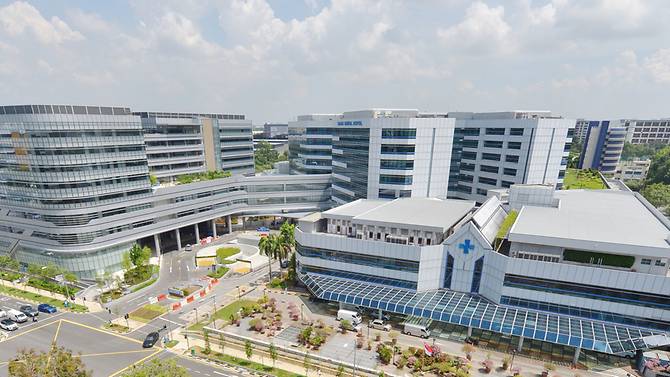- Joined
- Oct 30, 2014
- Messages
- 36,768
- Points
- 113

SINGAPORE: The Court of Appeal on Tuesday (Feb 26) granted a woman her appeal against Changi General Hospital (CGH) for delaying diagnosis of her lung cancer.
A High Court judge had dismissed the claims of negligence in February last year, finding that a nodule in one of Ms Noor Azlin Abdul Rahman's lungs had been benign when first detected in 2007.
However, the apex court on Tuesday found that CGH was in breach of its duty of care owed to the woman by failing to have in place a proper system for adequate follow-up of radiological results and patient management.
This resulted in a delay in diagnosing Ms Azlin with lung cancer, said Chief Justice Sundaresh Menon and Judges of Appeal Andrew Phang and Judith Prakash.
Ms Azlin first visited CGH in 2007, where an X-ray of her chest found opacity. She was referred to specialist respiratory physician Dr Imran Mohamed Noor, who ordered two further X-rays and assessed that the opacity "appeared to be resolving or had resolved on its own".
He gave Ms Azlin an open date for a follow-up. The woman went back to CGH twice, seeing two doctors at the Accident & Emergency (A&E) department in April 2010 and July 2011.
Both times, chest X-rays were performed on Ms Azlin, and the radiologist recommended follow-up for the opacity, but none was carried out.
A nodule was found in Ms Azlin's chest by a CGH respiratory physician only after she was referred there by Raffles Medical Clinic in late 2011 for coughing, breathlessness and blood in her phlegm.
A biopsy in February 2012 confirmed that the nodule was malignant and she had lung cancer. The cancer progressed to Stage IV in August 2014 and Ms Azlin was found to be suffering from a rare condition known as ALK gene arrangement.
By October 2016, the cancer had spread to her brain.
Ms Azlin sued CGH and three doctors in January 2015, saying that their negligence delayed the diagnosis and treatment of her lung cancer, causing it to go untreated.
Justice Belinda Ang in February last year ruled that the respondents had met the standard of care expected of them.
She said Ms Azlin did not have lung cancer, or that the nodule was benign, between October 2007 and July 2011.
Moreover, she was treated for her ALK-positive lung cancer at the earliest available time, because drugs approved for such a disease were available for clinical trials in Singapore only in 2013 and 2014 and only for patients suffering late-stage cancer.
CGH NEGLIGENT BUT DOCTORS NOT NEGLIGENT, COURT OF APPEAL FINDS
The Court of Appeal agreed with the High Court judge's decision that the two A&E doctors were not in breach of duty, as an A&E doctor "is not expected to conduct a general health screening". Instead, his priority is to resolve the patient's presenting complaints - in this case Ms Azlin's chest pains.
The apex court also agreed with the High Court judge's ruling that the first CGH doctor Ms Azlin had seen - Dr Imran - had breached his duty of care for failing to schedule a follow-up appointment, even though he was uncertain that the opacity in Ms Azlin's chest had resolved completely.
Although the judges found none of the doctors liable in negligence, they found that "CGH’s negligence caused a significant delay of at least seven months in diagnosis".
According to the appeal judges, the patient management system at CGH resulted in Ms Azlin, who had a persistent nodule in her lung, being seen by only one respiratory specialist over four years.
The system CGH had to review radiological reports was "inadequate" because it did not allow comprehensive management of patients, with "no appropriate mechanism for the consolidation of what was already known".
That is, each time Ms Azlin went to the A&E department, and each time a radiological report on her nodule was prepared, it was seemingly "treated as an isolated incident".
The A&E doctors did not have access to Dr Imran's notes, as his consultation with Ms Azlin had not been at A&E.
"CGH did not have a practice of sending its patients the report and test results from the scans conducted at the hospital," said the judges. "It was plainly unreasonable for CGH to rely on the patient's account of what happened at consultations outside of the A&E department.
"If the A&E doctor reviewing the radiological report had checked against Dr Imran’s notes, for example, it would have become immediately obvious to him that the only specialist who had seen her over the past four years had mistakenly concluded that the opacity was resolving or had resolved," said the judges.
The A&E doctor would have concluded that "the nodule had been persistent and had not been properly assessed by a specialist", they said.
The judges said an amicable settlement would allow Ms Azlin "to focus on battling her cancer and recovering as best as she can", saying it would be "appropriate for CGH to consider the possibility of a settlement in the interests of expediency and resolution".
The Court of Appeal judges have reserved costs and referred the question of loss and damages back to the High Court judge.
Read more at https://www.channelnewsasia.com/new...-lawsuit-lung-cancer-delay-diagnosis-11289948

